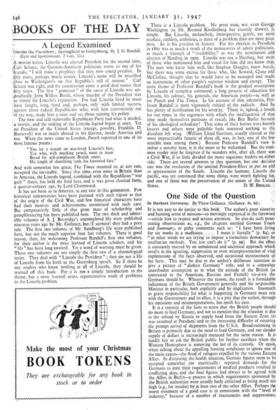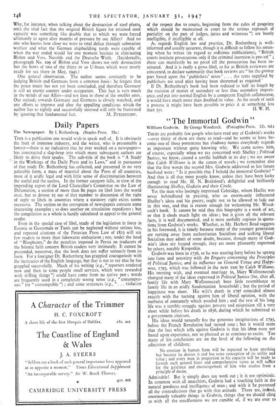One Side of the Question
In Darkest Germany. By Victor Gollancz. (Gollancz. 8s. 6d.) IT is not easy to do justice to this book. The author's great sincerity and burning sense of mission—so movingly expresscel in the foreword —entitle him to respect and serious attention. So also do such pent- trating observations as, e.g., the chapters entitled German Youth and Summary, or pithy comments such as: " I have " been living for six weeks in a madhouse. . . . I mean it literally " (p. 84), or " in other words we are trying to impose a formalistic democracy by totalitarian methods. You just can't.do it" (p. 99). But the effect is constantly marred by an unbalanced and uncritical approach which results in the ignoring, suppression or even misrepresentation of vital explanations of the facts observed, and occasional misstatement of the facts. This may be due to the author's deliberate intention io give a picture of " darkest Germany " only, and to a somewhat unorthodox assumption as to what the attitude of the British (a contrasted to the American, Russian and French) vis-à-vis the Germans should be. Whatever the reason, the result is a formidable indictment of the British Government generally and the responsible Minister in particular, both explicitly and by implication. Inasmubh as grave responsibility for what is happening in Germany must rest with the Government and its allies, it is a pity that the author, through his omissions and misinterpretations, has spoilt his case.
It is a travesty of the facts to stress that the British people should do more to feed Germany, and not to mention that the situation is dile to the refusal by Russia to supply food from the Eastern Zone (a was assumed at Potsdam) and to the increasing difficulty of ensuring the prompt arrival of shipments from the U.S.A. Bread-rationing 'in Britain is primarily due to the need to feed Germany, and our slender supply of dollars is increasingly menaced for the same reason. It is hardly fair to ask the British public for further sacrifices when the Western Hemisphere is removing the last of its controls. Or again, when talking about the appalling housing conditions to ignore one of the main causes—the flood of refugees expelled by the various Eastern Allies. In discussing the health situation, German figures seem to be accepted somewhat too uncritically : repeated demands - for the Germans to state their requirements of medical products resulted in conflicting data, and the final figures had always to be agreed wit the Allies in Berlin—a process in which requirements sponsored by the British authorities were usually hotly criticised as being much too high (e.g., for insulin) by at least two of the other Allies. Perhaps the worst treatment of a good case is in connection with the •" level of industry," because of a number of inaccuracies and suppressions. Why, for instance, when talking about the destruction of steel plants, omit the vital fact that the original British figure for retained steel capacity was something like double that to which we were forced ultimately to agree after months of pressure by out Allies? And no one who knows how close we were to total defeat through submarine warfare and what the German shipbuilding yards were capable of when the war ended would for one moment hesitate in eliminating Blohm und Voss, Navolds and the Deutsche Werft. (Incidentally, photograph No. io9 of Blohm und Voss shows not only destruction but the bows of two of the thirty or so U-boats which were nearly ready for sea there in May, 1945-) One general observation.. The author seems constantly to be judging British and Germans from a common basis : he forgets that the peace treaty has not yet been concluded, and therefore Germany is still an enemy country under occupation. This fact is very much in the minds of our Allies—and not least in those of the smaller ones. Our attitude towards Germany and Germans is closely watched, and any efforts to improve and alter the appalling conditions which the author has so rightly and successfully stressed will only be frustrated



































 Previous page
Previous page